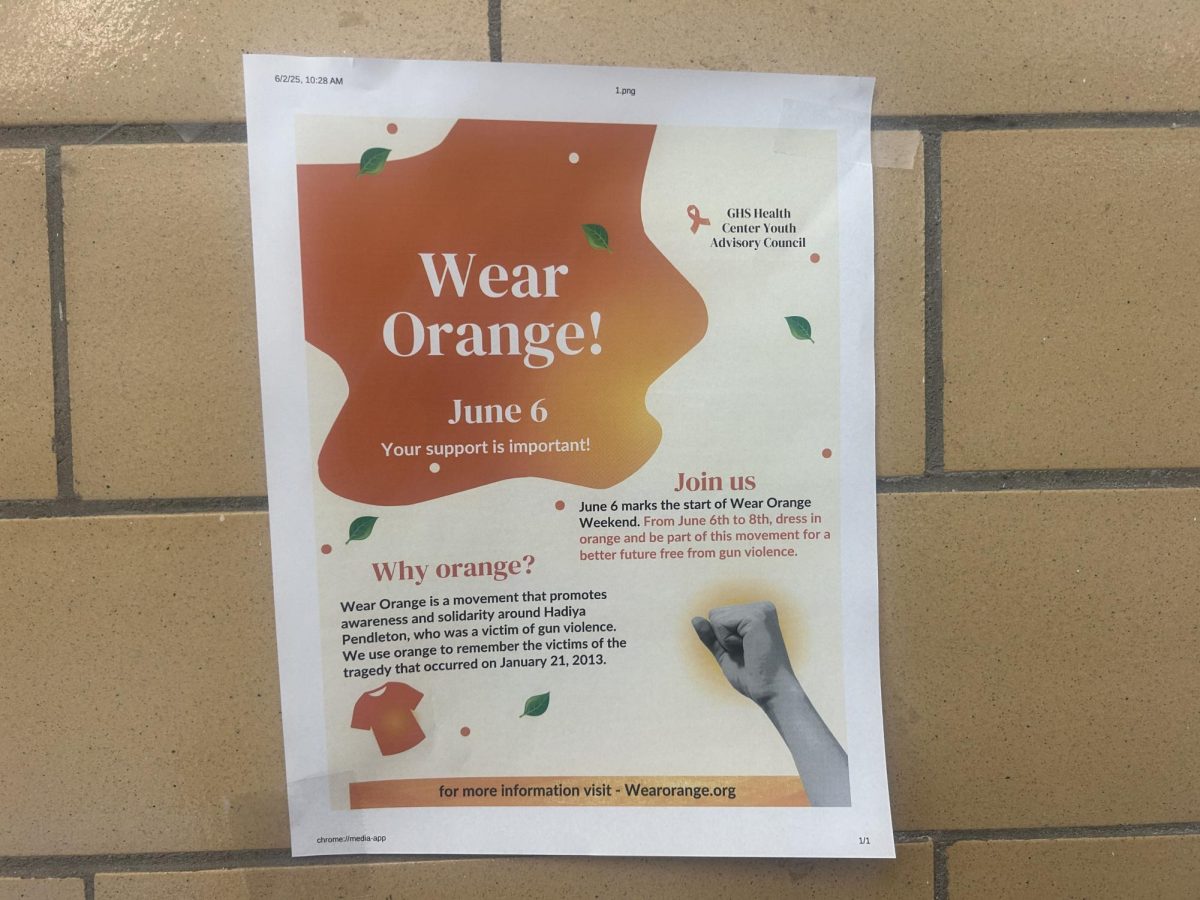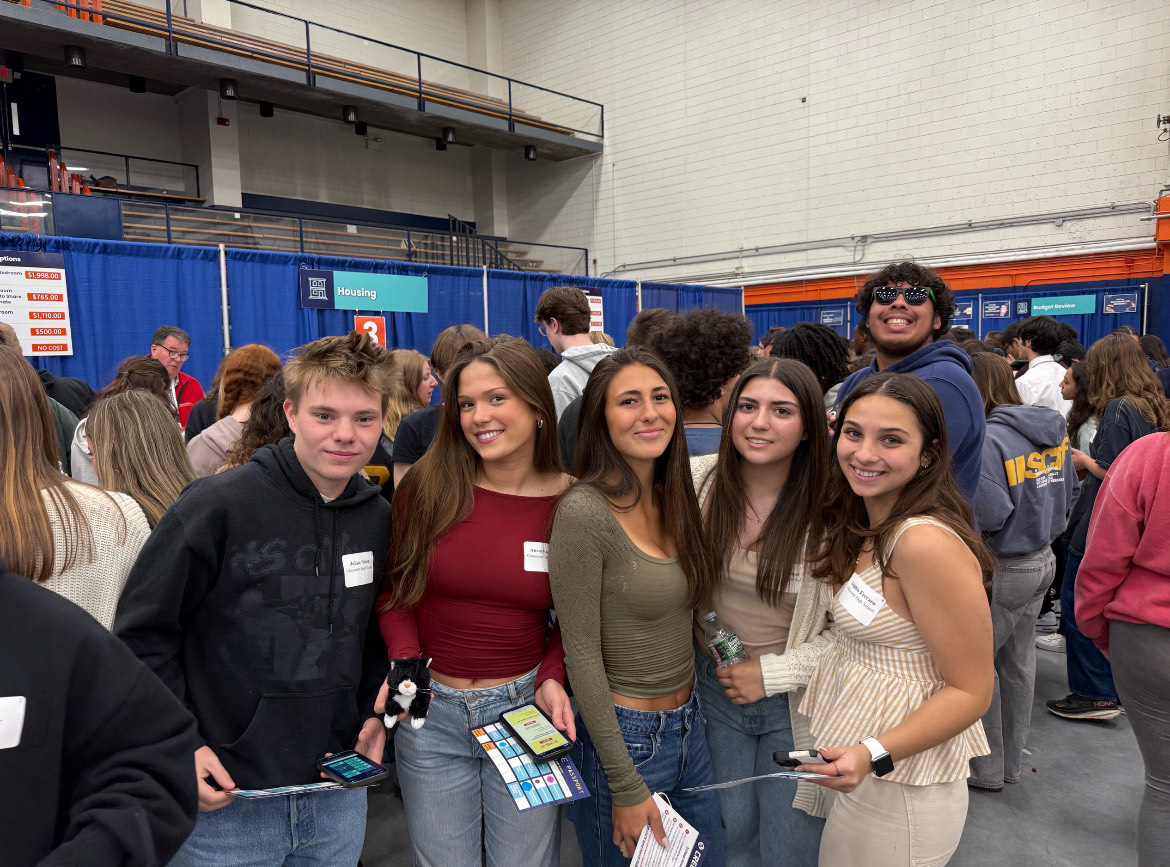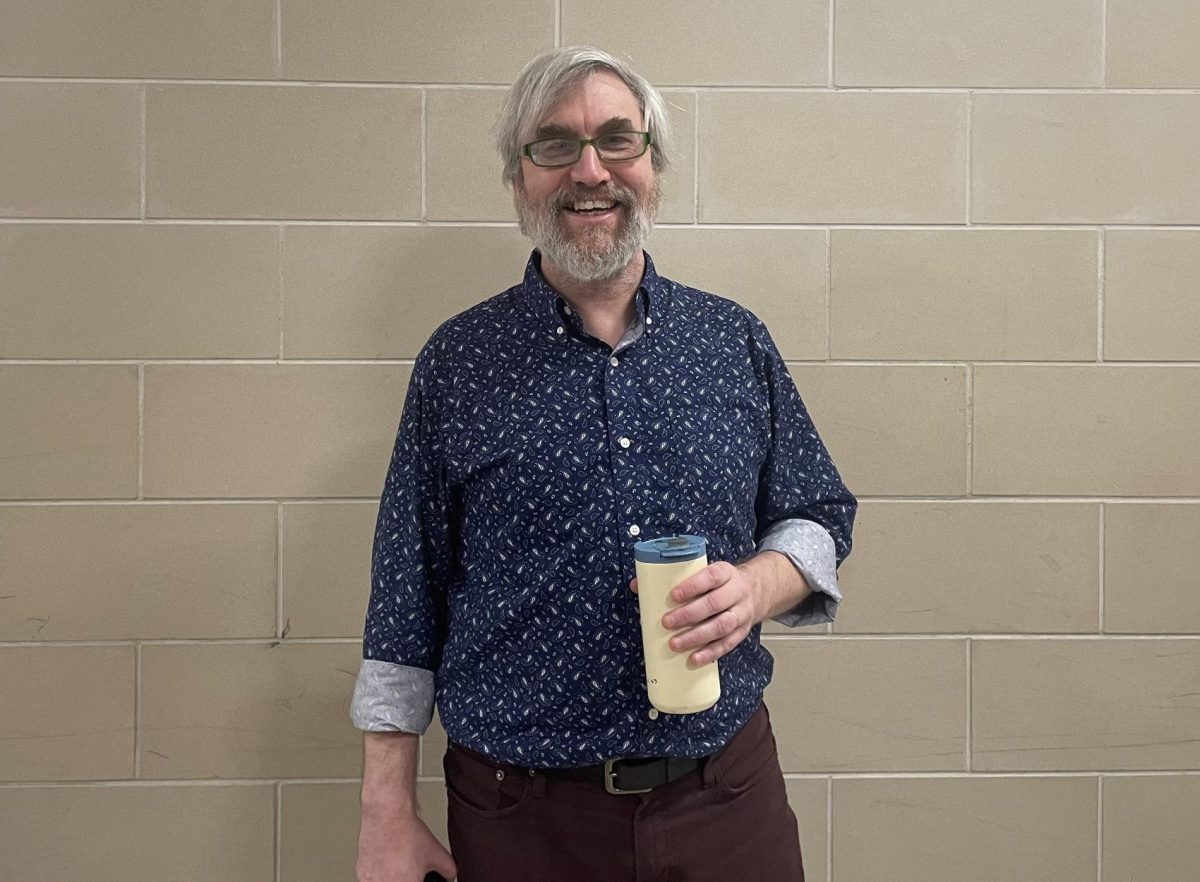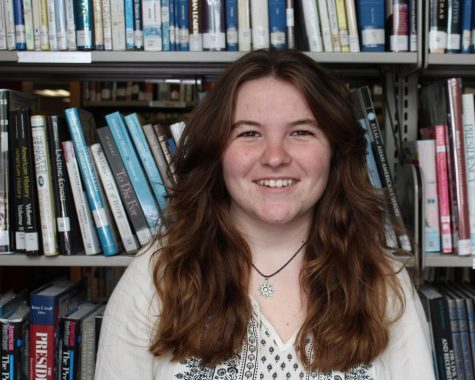What do international teens really think about America?
This Gillnetter editor went to Germany to find out
Courtesy of the Goethe Institut
Gillnetter writers Caroline Enos (third from left in first row) and Alexander Oaks (fourth from left in first row) visited Bielefeld, Germany for three weeks this summer through the Goethe Institut
September 6, 2017
As one of five American teenagers who attended a Goethe Institut international media education course in Bielefeld, Germany this summer, I expected to see dozens of diverse cultures among the sixty students from fifteen countries.
I was not disappointed in the language department. Almost every student could speak two to five languages, and sometimes even six or seven. What I was surprised to find was that the Indians sang Beyonce, the Romanians spoke perfect English, and pretty much everyone there dressed and acted like a typical American teenager.
“Americans are the coolest people in the world,” said eighteen year old Amina from Romania. “They have the coolest brands and a lot of technology. The first thing I think of when I think of America is ‘American Pie,’ which I recently found out nobody in America watches, and the Kardashians. You’re cool, man.”
Now I knew going into the program that America’s cultural influence is global. Beyonce is called an international superstar for a reason, and it’s well known that English is one of the most spoken languages in the world, especially in Europe. I just didn’t realize how influential- and even infuriating- this nation can be on the international scale.
The students in the program agreed that American pop culture affects teens globally. But when it came to America’s political presence and overall role on the world stage, one word was used to define America more than any other by the dozen European, Middle Eastern, and Indian teens interviewed.
Trump.
An international view of the 45th President
The new commander-in-chief’s political beliefs and actions have been acutely noted by the world’s youth. However, none of the students interviewed spoke about Trump’s distaste for Obamacare, his desire to cut taxes, or any other domestic issues within the US to describe their opinion of him.
“When he was elected, we had a discussion in class,” said seventeen year old Pilar, who is from Portugal. “Everyone was really mad, saying [Americans] don’t realize they’re going to affect the whole world with their president.’”
For Siddhant, Nikhila, and Akshit of India, Trump’s stance on immigration and desire to limit the distribution of H-1B visas, which allows foreigners to work in specialty fields in the US, hinders India’s traditionally vital contributions to technology and science.
“[Trump] has restricted the H-B1 visa. It will affect India as well the U.S.,” said fourteen year old Siddhant. “I’m not a big fan of it.”
Most of those interviewed claimed that they, and their countries, were shocked when Trump won.
“Everyone in Germany thought Clinton would win,” said sixteen year old Lahn Ahn, who lives in Frankfurt. “He was advertised to us as a sexist, a man who only thinks about America, and a man who doesn’t think about how things affect other countries.
“I think he is a sexist,” continued Lahn Anh. “but I cannot really answer to who he is [as a president] or what he is doing. Because I live in Germany, I have a different point of view than other countries.”
Having a specific perception of the world based on where one lives proved to be something to keep in mind when speaking with people abroad.
Sixteen year old Ivan lives in Ukraine, a nation torn by war over Russia’s influence and interference in the country. His view of Trump was built solely from the President’s “America first” policy.
“I like Trump because he is trying to protect his own people, which isn’t happening in my country,” said Ivan. “Our corrupted government is wasting money and tearing us apart into separate regions, like Crimea and Eastern Ukraine.”
As I got to know the students more, I noticed their views of the United States depended on the politics of their own countries, as well as their personal situations.
Trump’s stance on “radical Islamic terrorism” widens global religious divides
How countries must address global terrorism has been debated across the globe. For the United States, Trump attempted to cut Islamic presence in the country by trying to block immigration from seven predominantly Islamic nations and creating a “merit-based” visa-application process through a series of executive orders and proposed bills.
“It is about terrorism and not about religion. It is about Muslims from countries that support terrorism,” Trump’s finance chairman Steve Mnuchin said in response to the president’s July 24th “Meet the Press” interview. According to Trump in the interview, his administration looks towards banning immigration “from any nation that has been compromised by terrorism.”
Trump has cited keeping “radical Islamic Terrorists out of the United States” as his main motive for implementing these new policies.
For Muslims like sixteen year old Nadine and fifteen year old Joud from Jordan, these actions have done nothing but foster discrimination and a false representation of the Islamic religion.
“When Trump won the election, he said Muslims can’t enter and live in America,” said Joud in reference to his January executive order. “When he said that, we felt like we were poor. He didn’t respect our religion.”
For some, Trump’s rhetoric implies that Islam is synonymous with ISIS and global terrorism.
“ISIS thinks that because of their point of view, they can kill Christians,” said Joud. “But in the Quran, it says that we are all the same even if we all have different religions, and only God can judge us. Not anyone else.”
“[In our religion] one of the biggest sins is to kill innocent people,” said Nadine. “ISIS does the opposite of what is written in the Quran. The Quran says you can’t have sex before marriage, but then ISIS rapes people.”
The girls agreed that Americans and the rest of the world have to remember an important truth when dealing with terrorism.
“ISIS is not Islam,” said Joud.
“Don’t use religion as a political weapon,” stressed Nadine. “Don’t use God’s name in things like this.”
Americans continue to debate over ISIS and what means must be used to defeat it. As a result, the Middle East and Muslims across the globe are negatively affected.
How do U.S. actions abroad shape the world’s perception of us?
While Nadine has lived in Jordan for most of her life, she and her family originally hail from Baghdad, Iraq.
“When I think of America, I think of the people who invaded my country and killed my people,” said Nadine.
The U.S. officially invaded Iraq in March of 2003, starting the eight and a half year war that ousted Iraqi president Saddam Hussein and his regime. Nadine and her family were forced to flee in the several years following the invasion.
“My father worked at the German Embassy. He would come home at one o’clock every day and my sister and I would wait at the window looking for him,” said Nadine. “If he was even five minutes late, we would think he was dead. Embassy workers were being targeted.
“My father was almost shot in front of my eyes and I’ve seen flesh scattered all around buildings,” continued Nadine. “One of my good friend’s fathers was shot in front of my eyes. I’ve seen a lot of death.”
Many blame the United States for causing the political instability seen in the Middle East today, and for the rise of terrorist groups like ISIS.
“I think America created ISIS,” said Nadine, referring to the emergence of ISIS in the years of unrest that followed Hussein’s death. “Saddam Hussein wasn’t that bad [compared to ISIS]. He did a lot of bad things to his people, but everyone liked him. When he was our president, everyone was literate.
“It was the best time for Iraq when he was president,” she continued. “What the problem with Saddam is was that he declared war against Iran for nothing, against Israel, and tried to fight Palestine.”
Nadine also reiterated a common belief held by much of the world stage: America does not always respect other cultures.
“The most insulting thing is that [the Americans] killed Saddam on the first day of Eid al-Adha, when Muslims kill sheep and give them away. But he wasn’t a sheep and I find that insulting.”
When asked about her homeland’s perception of Trump, Nadine believes all American presidents are the same.
“[American presidents] all have agendas,” said Nadine. “Bush’s was to destroy Iraq and Palestine. Obama’s was Syria and Lebanon. And Trump, I guess, the Gulf Area. Everyone liked Obama because he was very diplomatic, but under the table he still did bad things, and Trump is our direct enemy.”
Despite the adversities placed on Nadine and her people by international American actions, she, like many others in the same situation, does not hate the United States.
“I hate the the American government and its politics, but I do not hate the American people,” said Nadine.
Nadine, Joud, and every other teen interviewed for this story come from different places with different cultures and political situations. Yet the United States has an impact on them in some way or form, whether that be good or bad.
“I don’t think Americans know what the world has been through because of their country,” said Nadine. “They’re proud to be Americans. But if I were an American, I wouldn’t be proud of that.”
The actions of the United States government have had severe global repercussions in recent years. The Islamic religion has become misunderstood as a hostile force, and many foreigners are concerned with how the world will fare under Trump and his agenda. But for the students whom I met on this trip, the U.S. is still much more than its occasional missteps.
“When I think of America, I think of a beautiful and huge landscape with a good spirit,” said Lahn Ahn. “An American spirit.”
































Cody Clifford • Sep 25, 2017 at 1:07 pm
I get that most of the writers of this paper don’t like our president. But that’s not what this article should’ve been about. There should’ve been questions exclusively about the culture of America, not its politics. By talking about the president in such a negative light, you’re only reinforcing the image that we should be disappointed in our president, and it takes away from the incredible students visiting from far off countries.
Caroline Enos • Sep 25, 2017 at 5:43 pm
Here’s the exact list of questions I asked each student:
1.) In your country, when you think of America, what is the first thing you think of?
2.) When you think of an American person, what do you think of?
3.) Do many people speak English in your country?
4.) What is the political situation in your country?
5.) How does America influence your country overall?
6.) How does American politics influence your country?
7.) What do you/your country think of Trump?
I did not only ask these students what their view of Trump was. As I explained in the article, America has such a significant influence both politically and culturally over the rest of the world that it would be surprising if they did not bring up Trump, or that if I- an American- would not ask about their views on my leader. Their opinions are their opinions, and as a wide range of international youth with very different backgrounds, their perspectives are relatively accurate for how the future of the world views Trump, American politics, and American culture. My job is to simply relay their perspectives on the local scale and help others understand that these students’ experiences are just as valid as any American’s.
Cody Clifford • Sep 26, 2017 at 9:11 am
I just think if you’re going to ask what international teens think about America, it needs to be broader than the list of questions you had. Nearly half of your questions are focused on politics when they need to be more focused on the actual culture – the food, the film industry, the art, the architecture, etc. When you ask the number of political based questions that you did, the result is an article that seems more politically charged rather than one that explores diversity in cultures.
Alexander Oaks • Sep 26, 2017 at 11:09 am
Hi Cody!
We love to hear about differing opinions. If you have a strong opinion about what you think this article should have revolved around, we advise and welcome you to do some research of your own about international youth. If you feel strongly about what this article “needed” to have, we suggest writing an article on your own. We look forward to reading it! Thanks for the comments!
Stephanie Hellmann • Sep 8, 2017 at 6:35 pm
Excellent article, Caroline! Thanks so much for this insight! I’m excited to share it!
Siddhant Mukherjee • Sep 8, 2017 at 8:47 am
Hats off to Caroline for writing such a well thought out and bold article. It was an treat to interact with you and all the Americans!